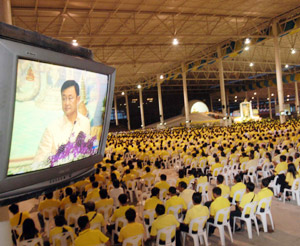Thaksin Shinawatra addressing thousands of local administrators at Wat Dhammakaya in Pathum Thani on Tuesday.
Kind of an Orwellian sight isn't it?
Results 1 to 4 of 4
Thread: Big Bother is at it again...
-
19-07-2006, 02:03 AM #1
Big Bother is at it again...
Last edited by Penzman; 19-07-2006 at 02:21 AM.
-
19-07-2006, 02:53 AM #2Khun Marmite
































- Join Date
- Nov 2005
- Last Online
- 19-03-2016 @ 06:03 PM
- Location
- ราไวย์, ภูเก็ต
- Posts
- 3,165
Welcome Penz! Yes, and I'm sure it'll get worse the nearer we get to the election.

-
19-07-2006, 07:07 PM #3
''What is happening in Thailand now is unbelievable to me, but there's nothing I can do. It's a lesson that we need a new round of political reform. Then we can reconcile to build up a set of fair rules for all,'' Mr Thaksin said in his address to 78,540 officials from 7,854 local administration bodies nationwide.
To think this guy once proclaimed to have a "reality show", sure is disconnected from reality.
-
22-07-2006, 12:49 AM #4
TRT does smell like cult...
BURNING ISSUE
PM shines at the temple of riches

Thaksin uses taxpayers' money to blast 'sore losers' at event held to honour the King
The government-organised event in honour of His Majesty the King at Dhammakaya Temple in Pathum Thani was a win-win move for caretaker Prime Minister Thaksin Shinawatra and the temple. But it also revealed how some people can seek personal benefits while claiming otherwise.
Thaksin got the chance to massage his ego by talking at length to nearly 80,000 people, the largest-ever assembly of elected local administrators.
He got the chance to criticise his political opponents as bad losers who do not respect electoral rules and results, despite the fact that a court nullified the April 2 general election.
Thaksin and his underlings also got the chance to stage a de facto political campaign by promising more populist freebies.
Thaksin also seized on the opportunity to project an image that he is still very much in the ball game and will not be bowing out - or be forced out - of politics any time soon.
Then the embattled premier went on to praise the scandal-ridden Dhammakaya Temple, in effect forging a significant alliance, as the temple commands some 200,000 to 300,000 followers, most of whom come from the educated middle class.
All this was achieved with a budget of Bt39 million out of taxpayers' pockets.
"I once sneaked into this temple and asked myself: 'Is there really such a great temple as this?' I was pleased to see it," Thaksin said, his comments broadcast live on local TV and via satellite to viewers outside Thailand.
The remark brought a big round of applause from hundreds of white-clad Dhammakaya followers, who offered their "free" services to the two-day gathering. The temple has been out of the media spotlight for a few years following a big scandal, and must be pleased to be getting such positive attention this time.
A special publication and CD were distributed promoting the temple to all the participants, and its senior monk got a chance to give a sermon.
In a way, Thaksin and Dhammakaya Temple are a natural alliance. Thaksin is one of the Kingdom's richest people and Dhammakaya Temple is known for its business-like accumulation of wealth and merits.
The temple is full of expensive modern mega-edifices, such as a giant hall shaped like a flying saucer. Its covered prayer hall, where the administrators met, is surely one of the country's largest.
The temple can accommodate as many as 300,000 worshippers when both floors are fully utilised.
Plastic bags distributed by the temple are printed with the motto: "Get rich quick, get really rich, all become rich."
It's the kind of thing multi-billionaires such as Thaksin could identify with and approve of.
Tuesday's event has shown that the anti-Thaksin People's Alliance for Democracy (PAD) does not have a monopoly on using the King as a pretext for political activities.
Although the PAD has stepped up its allegation that Thaksin is an anti-royalist, claiming his recent reference to "a charismatic person outside the Constitution" who opposes him could be a reference to the King, the game can be tricky.
Recently, a Chiang Mai University law lecturer claimed in the local media that PAD spokesman Suriyasai Katasila was not a genuine royalist.
The lecturer said Suriyasai had confided in him that he would try to find a way to atone for having acted as such a fervent royalist.
Those who disapprove of Thaksin but oppose using the monarchy as a reason to organise anti-government protests say relying on the King does not bode well for the future self-reliance of the people, or for participatory democracy itself.
However, both sides appear resolved to project even stronger royalist images in the near future, at least in public.
Pravit Rojanaphruk
The NationLast edited by Penzman; 22-07-2006 at 12:57 AM.
Thread Information
Users Browsing this Thread
There are currently 1 users browsing this thread. (0 members and 1 guests)





 Reply With Quote
Reply With Quote